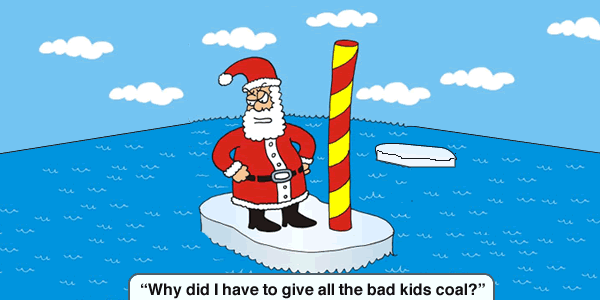When I was a kid, I was obsessed with Batman. Yet every Christmas morning, under the tree I found Superman merchandise. Apparently my parents couldn’t tell the difference, which led to several years of bitter disappointment.
The annual round of pre-Christmas Climate Change talks is starting to feel the same – every year they promise a lot and deliver little. The presents under New Zealand’s Christmas tree are even scanter – without action we are increasingly looking like the outsider.
The truth is that we could take action without hurting our economy, in fact in the long term taking action now would help our economy. And this doesn’t have to hurt farmers – in fact new evidence raises even more questions about methane and the need to make reducing carbon dioxide the priority.
Inching towards progress
This latest round of talks hasn’t delivered anything that will actually help this problem – all it has done is strike a balance between rich countries who say poor countries have to act, and poor countries who respond to rich countries “you first”.
This deal echoes the more tangible one struck earlier this year between China and the United States. The upshot is that the United States will reduce emissions, and in return China will reduce the rate of increase of emissions. That might sound unfair, but remember that China is a developing economy. The United States has already burnt a lot of coal and oil to get to the cushy Modern Family standard of living they have today.
Progress is slow, but like climate change itself it is coming. This year is set to be the hottest year on record, finally silencing the sceptics who falsely claim that warming has plateued since 1998. With rising temperatures comes a relentlessly creeping sea level and mounting disasters. The global voting public are waking up to this reality and increasingly demanding action. Will New Zealand be ready?
New Zealand needs to act
As we and many others have pointed out before, New Zealand is starting to look like a pariah on climate change, to a degree that puts our clean green credentials at risk. New Zealand has promised to reduce our emissions by 5% by 2020 (compared with 1990), but instead we are on track for a 25% rise. We currently have no plan or policy to achieve this goal.
Despite what you hear, business is not afraid of climate change. Sure, we hear bleats from the lobby groups that would be affected, but increasingly, business groups like Pure Advantage are calling for action. This year, a group of world leading economists set out ten ways to reduce emissions and improve growth at the same time. Even the insurance industry is talking openly about climate change – when you know the money guys are talking about something it has to be taken seriously.
Above all businesses want stability so they can make long term investments – take for example Meridian pulling out of a hydro project in Queensland. The worst thing we can do for business confidence is have policies that continually flip flop. By doing nothing until there is strong global action on climate change we are risking exactly that. If we wait until then we will have to make large, expensive changes to the way our economy is run. It is far cheaper to start acting now, making the long term investments to put us in good stead for a low carbon world.
And we can do it without hurting farmers – by excluding methane
Of course, farmers will be shaking in their gumboots at this prospect, but they needn’t be worried. Their biggest contribution to climate change is methane, but this gas deserves to be treated totally differently from other emissions. Let’s find out why.
Methane comes from several sources, one of which is cows and sheep burping and farting. It is a very potent greenhouse gas (meaning it traps a lot of heat), but it only lasts a relatively short time in the atmosphere. It is a completely different kettle of fish from the long lasting gases like the main one – carbon dioxide. We shouldn’t really compare the two, but our international partners insist on lumping all greenhouse gas emissions together in one number. To do this we have to use a conversion factor (like an exchange rate), to compare the impact of different gases. The upshot of this is that the conversion factor for methane (25 times carbon dioxide) is miles too high.
Victoria University research shows until we reduce carbon dioxide emissions, action on methane is pointless. More recently Victoria University scientists have noticed that methane levels in the atmosphere aren’t rising as quickly as we expected. It is like the case of the missing fart (or burp). Part of the reason that methane is seen as so nasty is because scientists thought that the more methane there was in the atmosphere, the longer it would hang around. The chemistry of this is complex, but suffice to say that there is a helpful chemical (the hydroxl radical) in the atmosphere that over time helps convert methane into less nasty gases. Scientists used to think that having more methane in the atmosphere would run down our supply of this helpful chemical, but for some reason it is not.
We need to get the world thinking about methane differently from other gases. It needs to be excluded from emissions reductions talks, or at least reduced in its potency. This is not only to ensure we can provide a secure food supply for a growing population, but simply because it makes scientific sense.
This is all the more reason to take action on emissions elsewhere in our economy. If New Zealand was taking action on our carbon dioxide emissions, we might have the credibility for the world to listen to our issues around methane.

